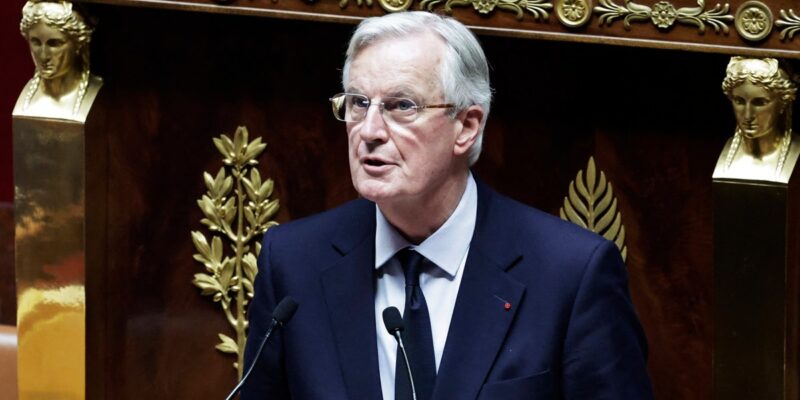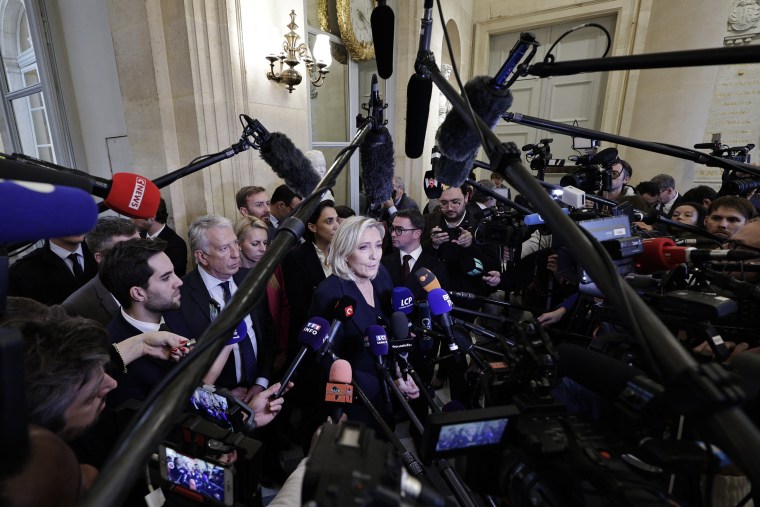
Just as Paris’ Notre-Dame cathedral rises from the ashes, France’s government is teetering on the brink of collapse.
President Emmanuel Macron put on a brave face last week while touring the rebuilt Paris landmark gutted by fire in 2019, as his administration hailed the reconstruction as a symbol of national unity and French can-do.
But his fragile parliamentary coalition could be toppled by an unlikely combination of far-right and leftist opponents Wednesday.
“The country is at a turning point,” Finance Minister Antoine Armand told French television Tuesday, urging its politicians “not to plunge the country into uncertainty.”
It’s the latest chapter in the political instability roiling France and Europe as a whole, where far-right populists and nationalists — many of them allies of American President-elect Donald Trump — are capitalizing on public discontent about rising prices and immigration, and challenging mainstream political parties.
Here’s what to know:
Why the French furor?
Macron’s center-right prime minister, Michel Barnier, is facing a no-confidence vote tabled by far-right leader Marine Le Pen and her National Rally party. The left-wing New Popular Front coalition has also filed a similar motion, teeing up a debate and vote in the National Assembly starting 4 p.m. local time (10 a.m. ET).
Barnier, who was appointed by Macron in September, told French TV Tuesday that it was “possible” he could survive. But the math does not look good for him.
Only 289 votes from the 577 lawmakers will be needed to secure his ouster and the far-right and leftist factions number more than 320.
If the government falls, it would be the shortest lived in France’s history.

Marine Le Pen’s National Rally party tabled a vote of no confidence in Barnier. Stephane De Sakutin / AFP – Getty Images
“France is currently looking ungovernable,” said Rainbow Murray, a professor specializing in French politics at Queen Mary University of London. “Even if this government falls and is replaced by another, there’s no guarantee that a new one will fare any better.”
The main disagreement centers over Barnier’s attempts to rein in France’s soaring budget deficit. After France spent billions during the pandemic, Barnier wants to cut 40 billion euros ($42 billion) in spending and raise taxes by 20 billion euros.
France’s deficit is currently projected to hit 6.1% of GDP, far higher than than the European Union requirement of 3% or lower. The looming economic and political crises has spooked markets, with French borrowing costs briefly rising above those of Greece on Monday.
Without a majority in France’s lower house, Barnier has told lawmakers he plans to use Article 49.3 of the French Constitution — often referred to as a “take it or leave it” ultimatum.
This means he can pass legislation without a vote, but his opponents can table votes of no confidence against him if they wish and this time they have.
A divided legislature
After Macron stunned Europe by calling snap parliamentary elections in June, Le Pen was only blocked from power by Macron’s centrists and their left-wing opponents working together tactically.
The upshot was a legislature divided between left, center and far-right — with none holding enough power to govern securely alone.
“These are three political groups that can’t work together and it’s been impossible to find a consensus,” said Murray.

Macron cannot run again for president at the next election in 2027. Nathan Laine / Bloomberg via Getty Images
Macron shunned the leftists, who won the most seats without securing a majority, and instead tapped Barnier, who was able to cobble together enough conservatives and centrists to govern without an absolute majority.
While the outraged left have regularly voted against him, Barnier has been able to work with the far-right by making policy concessions on issues such as crime and immigration. But Le Pen says the budget cuts and tax rises are “red lines” she will not cross.
“We said what were the nonnegotiable elements for us,” she said Monday. “We are straight in our political approach. We defend the French people.”

Taxi drivers protest a new pricing system in Lyon, France, on Monday. Olivier Chassignole / AFP – Getty Images
This creates a huge headache for Macron, who is responsible for appointing prime ministers to be approved by parliament. But he cannot dissolve the parliament again until 2025, meaning he has to work with what he’s got.
While he could try to bring Barnier back in, appoint a successor or an apolitical government of technocrats, all would be vulnerable to dethroning by the far-right.
If Macron “cannot get a government together with the support of a majority in parliament, he is going out and going to come under increasing pressure to resign,” said Douglas Webber, an emeritus professor at the INSEAD business school, based in Paris.
Rise of the far right
France, Europe’s second largest economy, is just one of several Old World powers whose establishment is creaking under pressure from the hard right.
The continent’s other powerhouse, Germany, is also in crisis. Its left-wing coalition collapsed in November and the far-right Alternative for Germany is polling in second place ahead of February elections.
The far right have also made gains in the Netherlands, Austria, Finland and elsewhere. Many of them have welcomed Trump’s election to a second term, setting up the prospect of a transatlantic alliance between these bedfellow forces that were recently regarded as a political fringe.
“There is a hollow core at the heart of Europe because the Franco-German engine, which is supposed to keep the E.U. ticking over and on the rails, is now derailed,” Webber said. “There is a kind of vacuum at the heart of Europe at a very unfavorable time.”
In France, the big prize will be won or lost in 2027, the date of the next presidential election.
Macron cannot run again due to term limits, leaving Le Pen as the current bookmakers’ favorite. One wrinkle for her could be her ongoing trial on accusations of embezzling European Union funds, in which prosecutors are requesting a five-year ban from public office. She denies the charges, calling them an “outrage.”
That could “rule her out of the next presidential election,” Murray from Queen Mary said. “Unless it’s brought forward.”















